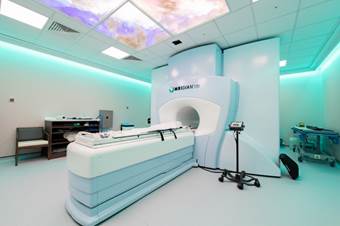A new radiotherapy treatment which dramatically cuts treatment times for cancer patients has been launched at GenesisCare UK’s treatment centre in Oxford.
The MRIdian combines magnetic resonance imaging techniques with precise radiotherapy beams, enabling clinicians to adapt radiation treatment in real time to take account of anatomical changes and tumour movement.
This means clinicians can adjust the dose more easily, reducing side-effects and potentially cutting treatment times by 75%.
To date, the technology has been used to treat 7,000 patients worldwide, with the greatest potential benefits seen in those with prostate, liver, pancreas and lung tumours.
According to GenesisCare UK, the technology could mean that patients with early stage prostate cancer can be treated in days rather than weeks. Patients would typically require at least 20 treatments with conventional radiotherapy. However, with the MRIdian they may only need five.
Dr Philip Camilleri, clinical director of urological cancers at GenesisCare UK, Oxford, said: ‘Treatment on the MRIdian allows us to be virtually 100% accurate, 100% of the time. I’m delighted that GenesisCare has been able to bring this technology to the UK for the first time as I have seen significant benefits this brings to patients. This treatment allows us to adapt the radiation field to the daily changes in anatomy of the target and the surrounding areas, ensuring that treatment on the MRIdian is as accurate and effective as possible each and every day.’
NHS patients will have early access to the new technology in clinical trials through a ten-year partnership between Genesis care and the University of Oxford, which was agreed earlier this year.
Professor Mark Middleton, head of the department of oncology at the University of Oxford said: ‘We are very excited to be working with GenesisCare on the MRIdian. The opening of the new facility is a significant step forward in our collaboration. Our partnership will allow NHS patients to access this important new treatment and our research together will ensure we get the most out of the new technology’







 ©2024 All rights reserved LaingBuisson
©2024 All rights reserved LaingBuisson 


